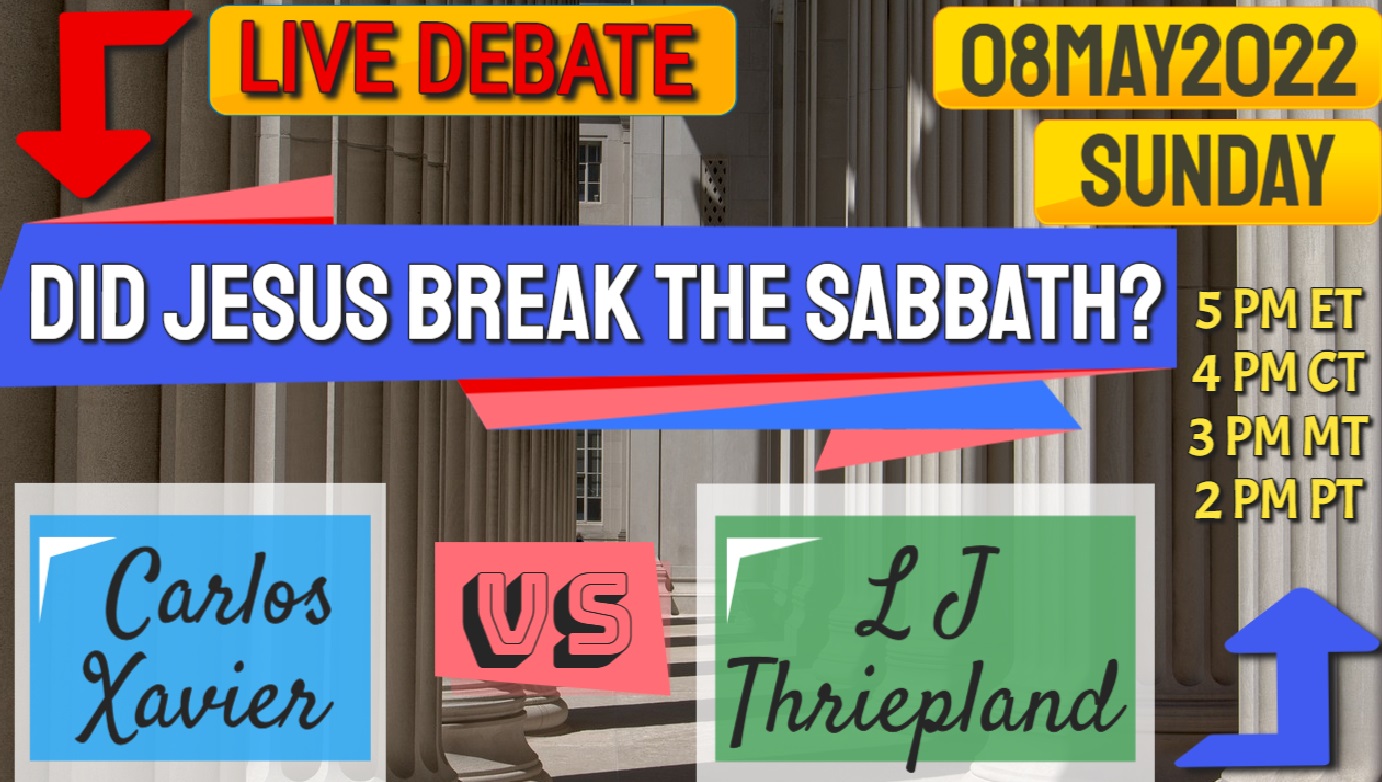
“A New Theological Vocabulary”
May 15, 2022
Did Jesus Break the Sabbath? Debate open
May 15, 2022Is Jesus God in Ps 110:1? Debate open

No because
- The 2nd lord is called adoni not Adonai, i.e., YHWH;
- Jesus is the lord Messiah and not the LORD God.
- God commands Jesus to sit at His right hand.
- Adonai is not adoni.
In Matthew 22 Jesus interprets Psalm 110:1 as an oracle [i.e., prophetic word] from David who, in the spirit, says:
“The LORD says to my lord.
Sit at my right hand until I make your enemies your footstool.”
Dr Michael Brown, a Messianic Jew, in his vol 3 of Jewish Objections to Jesus notes that “a tradition developed among the Jewish people that the Hebrew name for God, yhwh, was too sacred to pronounce.
Thus, whenever a Jew would read this name in the Bible…he would say, ʾadonai, meaning “Lord.”
Thus, the opening verse of Psalm 110 would have been recited out loud as ʾadonay said to ʾadoni.”
“When Jesus quoted this verse to the Pharisees, this would have been the way he said it, referring to Yahweh as ʾadonai.
There were no tricks here, no sleight of hand, no cover-up, no deception, no mistranslation.
Just a straightforward recitation of the Hebrew text.
No one would have thought that Jesus was claiming to be Yahweh, since his hearers certainly knew the text by heart as well, and since they distinctly heard two different words for Lord and lord: ʾadonai, meaning Yahweh, and ʾadoni, meaning my Lord or my lord.”
Brown adds that “just as Jewish readers distinguished between [the two lords] virtually all modern Christian translations follow a similar translation pattern….since the English custom for more than 500 years has been to render yhwh with LORD (all uppercase)”.
The article under the word “Lord” in the International Standard Bible Encyclopedia (Vol. 3, p. 157) verifies Brown’s claims:
“The form adoni (‘my lord’), a royal title (1 Sam. 29:8), is to be carefully distinguished from the divine title Adonai (‘my Lord,’ ‘Lord,’ or ‘O Lord’).”
Dr. Brown adds that “If Jesus quoted the verse in Aramaic, he could well have said marya (meaning Yahweh) said to mari (“my lord/Lord”), following the exact same custom as in Hebrew.”
The same distinctions are born out by both the LXX and NT Greek when they translate YHWH as Kyrios and l’adoni as to kyrio mou.
The latter, to kyrio mou (to my lord) is never used for God but only humans like Abraham, David, etc.
The noted Word Biblical Commentary on Matthew (called the state of the art in theology) says:
“Underlying the two uses of kyrios are two different Hebrew words:
The first is the tetragrammaton (the personal name ‘Yahweh,’ which was not spoken by the Jews, who substituted the word adonay….
The second is adoni, ‘my lord.’
David calls his son not Yahweh but adoni, ‘my lord’:
‘Yahweh [the Lord] said to my lord.'” (p. 651)
The same for the WBC on Mark:
“The LXX approximates the Hebrew, which uses different words for ‘lord’: neum YHWH l’adoni, ‘oracle of Yahweh to my lord.'” (p. 273)
2. The lord Messiah
The reason Ps 110.1 is the key controlling and definitional Christological verse in the NT is that the title lord is used the title Christ well over 200 times!
For example Luke 2:11 says the lord Messiah is born and Paul repeatedly greets and farewells the churches with the phrase “from the God of our lord Messiah.”
So instead of concluding that the Son of God is somehow God Himself, another Yahweh, it’s “more likely,” as the late Dr. James Dunn put it, “that Yahweh has bestowed his own unique saving power on the Lord who sits on his right side [as per Ps 110:1];
The exalted Jesus is himself the embodiment as well as the executive of that saving power.”
(Dunn, Did the First Christians Worship Jesus? p 105)
Dunn sums up saying:
“To call Jesus Lord was as much a way of distingushing Christ from the one God as of attributing to him God’s agency.”
(Dunn, The Christ and the Spirit, p 16)
These observations align with the fact that ancient Judaism applied Ps 110.1 to various human figures from Adam, Abraham, Elijah and even the saints.
In other words, no Jew would ever have read the verse as saying:
Adonai says to Adonai!
3. Sit at My right hand.
Lastly, to sit at the right hand connotes conferred authority in a royal setting, I.e., a person who has been told to sit in a place of honor.
Therefore, he is subordinate to the one who commanded:
Sit at my right hand.
The NET Bible
To sit at the “right hand” of the king was an honor (see 1 Kgs 2:19).”
“The Lord’s invitation to the Davidic king to sit down at his right hand reflects the king’s position as the Lord’s vice-regent.”
Bishop N.T. Wright, Preface to How God Became King: Getting to the heart of the Gospels, 2012.
“Jesus, through his Ascension, was seated at the right hand of the Father.
In ancient Jewish thought, with echoes of Daniel 7, this could only mean that, from that moment, Jesus was the Father’s right-hand man….
The Father’s accredited and appointed agent.”
[So when the Apostles ask Jesus “Let one of us sit at your right” in Mar 10.37 they meant:
“We want to sit in places of honor next to you,” as the NLT best captures the meaning of their petition.
And no one at the time would have confused the Apostles with Jesus!]
The point is that in Ps 110.1 God grants David’s human lord unprecedented authority and power because he is the LORD’s Messiah (Luke 2:26), unique chosen agent.
The royal imagery and setting goes back to the most used OT verses by the NT writers, Dan 7.13-14!
This is yet another prophecy where Daniel sees a glorified human figure presented to the Ancient of Days, i.e., God.
“And to him was given dominion and glory and a kingdom, that all peoples, nations, and languages should serve him.” Dan 7.14
The Eerdmans Commentary on the Bible explains what the vision means:
“As the human being described in Daniel 7, the human being to whom divine authority is granted, Jesus has authority to forgive sins…
Jesus has not claimed to be God (if he had, the scribes would have reacted much more violently);
He has claimed to be God’s vice-regent on earth.
[And] while the son of man figure is similar to the Ancient of Days in John’s vision of the resurrected Jesus, there is no of equivalency or identification.
In fact, the giving of authority, power, glory to the son of man implies that his status is subject and therefore different from that of the Ancient of Days.”
It would be redundant to say adoni is Adonai, i.e., Almighty God, since we all know God is All-powerful.
God cannot be told to sit giving it to him would be redundant. The royal setting shows the recipient told to sit in a place of honor and it would be nonsensical if not blasphemous for this to be God!
Summary
To summarize:
- Jesus is David’s adoni not another Adonai, i.e., another Yahweh!
Ancient Judaism confirms this by identifying the 2nd lord of Psalm 110 with other prominent human figures like Abraham, David, never to Adonai, YHWH God!
- In the NT the title lord for Jesus is linked with the title Christ hundreds of times!
- God commands this figure to sit at His right hand which means he is subordinate to God and any authority, power he possesses was given by God!
